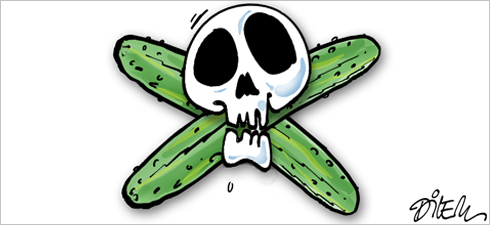Reported three weeks ago in Germany, the bacterium E. coli has since spread around Europe, killing 16 people, 15 of them in Germany, and infecting over 300. After declaring originally that the bacteria came from a Spanish cucumber, health authorities in Hamburg now admit that the source of the poisoning is still unknown.
“While Europeans are blundering about seeking the origins of cucurbits tainted with E. coli, the number of victims is growing,” writes the Romanian newspaper Jurnalul Naţional with some asperity: “Europe is trembling with fear,” the paper sums up. The Bucharest daily justifies its assertion by quoting an interview with the university biologist Gheorghe Mencinicopschi:
'Cucumber flu’ is the new organic food bogeyman. I am convinced that this is just another episode in the series of bird flu, swine flu... In other words, we are being encouraged to stop eating pork and chicken. Today vegetables, tomorrow fruit. In the end, we’ll all be eating fast food.
The German press is restricting itself to advising consumers and to ongoing research, while taking note of the criticism of Germany starting to come in from its European partners. The Frankfurter Allgemeine Zeitung is an exception, in reviewing a -
... Kafkaesque week for German vegetable producers…. While health crises usually start with the discovery of the cause of a potential health risk – tottering cows, sneezing pigs, machine oil in feed – the case of EHEC has begun with death. Epidemiologists are working like forensic commissioners investigating a murder. The circle of suspects is enormous.
In Spain, anti-German feeling is running high. The health minister of the state of Hamburg, Cornelia Prüfer-Storcks, has confirmed that the analyses have ruled out the Spanish origin of the E. coli, but “she did not apologise” writes El Mundo in its editorial. “It is clear that the primary responsibility for the situation lies with Germany,” whose government “has been unable to pin any blame on the Hamburg authorities and so to redirect the case” despite “the senseless action” of the counsellor, “who failed to follow the European protocols provided for food scares.” But there are even more reasons to criticise the impotence of the Spanish government, which reveals “its lack of reflexes” and “whose protests failed to sway Germany.”
Germany must now make amends, writes La Razón in its editorial:
This does not mean, however, that the problem has been forgotten. First, because panic is a state of mind very difficult to master, and secondly, because the damage to farmers has been too significant…. What is required is a national campaign by the German authorities on behalf of our vegetables, and the corresponding financial compensation.
ForPúblico, the cucumber crisis-
... makes manifest the weakness of the EU in handling these situations to prevent unfounded accusations causing enormous damage throughout an entire economic sector of a member state.
The heart of the problem for French daily Libération is, firstly, mistrust which-
... cannot establish itself as public health policy. It fuels panic just when consumers need to be enlightened and informed. This policy of psychosis is devastating for the economy, and even more so for public health.
Finally, for the Dutch daily De Volkskrant:
It is not the cucumbers that are scary, but the incompetence of the authorities in limiting the spread of the infection…. This inability to clarify the situation probably reflects very well the lack of transparency in the free market for vegetables and fruits in Europe and in the member countries.
In conclusion, the Amsterdam daily writes:
Giving up eating cucumbers is a showy display of ludicrous hysteria, especially if consumers wash and peel their vegetables – as has always been recommended.
Was this article useful? If so we are delighted!
It is freely available because we believe that the right to free and independent information is essential for democracy. But this right is not guaranteed forever, and independence comes at a cost. We need your support in order to continue publishing independent, multilingual news for all Europeans.
Discover our subscription offers and their exclusive benefits and become a member of our community now!












